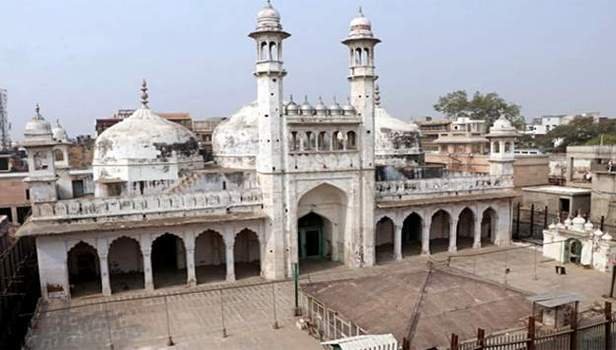Gyanvapi Masjid case: Court gives Hindu side right to worship in basement
31 Jan 2024 ( Perwez Anwer, MD & CEO, IBTN GROUP )
Gyanvapi Masjid case: Court gives Hindu side right to worship in basement
Wednesday, January 31, 2024
The court of Varanasi in the Indian state of Uttar Pradesh has given its verdict in support of the Hindu side in the case of Gyanvapi Mosque. The Varanasi court has given the Hindu side the right to worship in the Vyas basement of the Gyanvapi Mosque.
The order issued by the court reads - "District Magistrate, Varanasi/Receiver is directed to hand over the basement situated on the south side of the building situated at Settlement Plot No. 9130 Thana-Chowk, District Varanasi, which is the suit property. "The plaintiff and the priest designated by the Kashi Vishwanath Trust Board should get the puja, raga-bhog performed for the idols located in the basement and for this purpose, make proper arrangements in the iron fence etc. within 7 days."
Hindu side's lawyer Vishnu Shankar Jain, while talking to the media, said, "The district administration has been asked to make arrangements for conducting the puja within seven days. As soon as the administration does this, the puja will start."
Vishnu Shankar Jain has also commented on the rules and regulations for worshiping in the mosque premises.
Vishnu Shankar Jain said, "Kashi Vishwanath Trust will decide how the puja will be conducted. It knows better. It was our legal work which we have completed. Now it is up to the Kashi Vishwanath Trust to start the puja. From the devotees to Priests etc. will all be allowed to go.''
"I want to say that Justice KM Pandey had ordered opening of the lock of Ram Temple on February 1, 1986. I see today's order in comparison to that. This is the turning point of this case. A government Misusing his power, he had stopped the worship of the Hindu community. Today the court has rectified it with its pen."
Dr. Rajiv Dhawan, a senior lawyer of the Supreme Court of India and an expert on constitutional matters, even feels that the courts have become weak in maintaining secularism. Dr Rajeev Dhawan said, “The Places of Worship Act was completely forgotten in the Gyanvapi case.”
What is the Places of Worship Act?
It was enacted to stabilize the status of religious places of worship as they existed on August 15, 1947, and prohibit the conversion of any places of worship and ensure the maintenance of their religious character.
Section 3 of the Places of Worship Act declares that no person shall convert a place of worship of any religious sect into that of a different religious sect or sect. Section 4(1) provides that the religious character of the place of worship will remain the same as it was on 15 August 1947.
The Varanasi court has given its verdict in support of the Hindu side in the Gyanvapi Mosque case. The Varanasi court has given the Hindu side the right to worship in the Vyas basement of the Gyanvapi Mosque. Here the question arises whether this is not a complete violation of the Places of Worship Act by the Varanasi court in the Gyanvapi case? Is this not an attempt to change the character of Gyanvapi Masjid in the Gyanvapi case?
According to the Places of Worship Act, no person shall convert a place of worship of any religious sect into a different religious sect or sect. Section 4(1) provides that the religious character of the place of worship will remain the same as it was on 15 August 1947.
Then why did the Varanasi court give the Hindu side the right to worship in the Vyas basement of the Gyanvapi Mosque? This is a big question that needs to be answered.
(Click here for Android APP of IBTN. You can follow us on facebook and Twitter)
Share This News
About sharing
-
 15 Nov 2025
Why did the Grand Alliance suffer a crushing defeat in the 2025 Bihar Assembly elections?: Analysis
15 Nov 2025
Why did the Grand Alliance suffer a crushing defeat in the 2025 Bihar Assembly elections?: Analysis
Why did the Grand Alliance suffer a crushing defeat in the 2025 Bihar Assembly elec...
-
 12 Nov 2025
LIVE: India, Pakistan launch probes after blasts in New Delhi, Islamabad
12 Nov 2025
LIVE: India, Pakistan launch probes after blasts in New Delhi, Islamabad
LIVE: India, Pakistan launch probes after blasts in New Delhi, Islamabad
-
 11 Nov 2025
Delhi Red Fort blast live: Terrorism law invoked in India after 13 killed
11 Nov 2025
Delhi Red Fort blast live: Terrorism law invoked in India after 13 killed
Delhi Red Fort blast live: Terrorism law invoked in India after 13 killed<...
-
 05 Aug 2025
At least four dead, dozens missing as flash floods hit north India village
05 Aug 2025
At least four dead, dozens missing as flash floods hit north India village
At least four dead, dozens missing as flash floods hit north India village
-
 12 Jun 2025
Air India flight crashes in Ahmedabad with more than 240 people on board
12 Jun 2025
Air India flight crashes in Ahmedabad with more than 240 people on board
Air India flight crashes in Ahmedabad with more than 240 people on board



